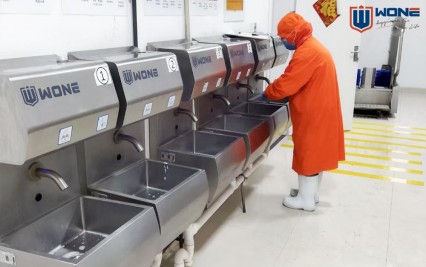Time Control of Hand Cleaning in the Food Industry: The Role of Automatic Hand Washing Stations

Introduction:
In an industry where hygiene is of utmost importance, the food industry has always prioritized proper hand cleaning practices. Maintaining clean hands not only prevents the spread of harmful bacteria and viruses but also ensures the safety and quality of the food produced. With the advancement in technology, the introduction of automatic hand washing stations has revolutionized the way hand cleaning is done, providing an efficient and time-controlled solution. This article will explore the significance of time control of hand cleaning in the food industry and how automatic hand washing stations have become an integral part of this process.
Importance of Hand Cleaning in the Food Industry:
In the food industry, the potential for cross-contamination is high, making proper hand cleaning practices crucial. Employees who handle raw food, ingredients, and packaging materials must maintain impeccable hygiene to prevent the transfer of harmful microorganisms. Failure to do so can result in foodborne illnesses, damaged brand reputation, legal issues, and financial losses. Therefore, establishments in the food industry must implement rigorous hand cleaning protocols.
Time Control of Hand Cleaning:
Time control plays a vital role in effective hand cleaning practices. Research suggests that a minimum of 20-30 seconds is required to thoroughly clean hands and eliminate bacteria. Timely hand cleaning ensures the removal of pathogens from the hands and significantly reduces the risk of contamination during food handling processes. Without proper time control, individuals may neglect the essential steps required for thorough hand cleaning. This is where automatic hand washing stations prove to be valuable.
Automatic Hand Washing Stations:
Automatic hand washing stations are designed to offer a time-controlled and efficient solution to hand cleaning. These stations are equipped with touchless sensors that detect when hands are placed in the sink area. As soon as hands are detected, the station initiates the handwashing process, ensuring consistent and complete hand coverage. The automated system regulates the water flow, indicates the appropriate amount of soap, and even monitors the duration for which hands must be washed. This technology eliminates the user's guesswork and encourages compliance with the recommended hand cleaning time. Additionally, some stations also provide the option of warm air hand drying, minimizing the need for additional paper towel usage.
.png)
Benefits of Automatic Hand Washing Stations:
1. Time Efficiency: Automatic hand washing stations reduce the time required for each handwashing session, increasing productivity in the food industry. Streamlining this process allows employees to spend more time on food preparation and serving customers.
2. Enhanced Hygiene Compliance: The time control feature of these stations ensures that employees comply with the recommended handwashing duration. This reduces the risk of insufficient hand cleaning and ensures consistent and thorough hygiene practices among staff members.
3. Reduced Water Consumption: Traditional handwashing methods often lead to excessive water wastage. Automatic hand washing stations regulate water flow, minimizing water usage and contributing to sustainable practices.
4. Improved Safety Standards: Automatic hand washing stations act as an added safety measure, providing a standardized approach to hand cleaning. The consistency and thoroughness offered by these stations help establishments maintain high safety standards and adhere to regulatory requirements.
Implementation Challenges:
While the advantages of automatic hand washing stations in the food industry are evident, there are a few challenges associated with their implementation. Initial costs, installation requirements, and maintenance may pose economic barriers for some establishments. Adequate training to ensure proper usage of the stations is crucial, as employees need to understand the importance of time control and the correct handwashing techniques. Overcoming these challenges requires investment, planning, and a commitment to maintaining hygiene in the long run.
Conclusion:
In the food industry, time control of hand cleaning is a critical aspect of ensuring food safety and quality. Automatic hand washing stations have emerged as a valuable solution, streamlining the hand cleaning process, and promoting compliance with recommended handwashing durations. These innovative stations offer time efficiency, enhanced hygiene compliance, reduced water consumption, and improved safety standards. Despite the challenges associated with their implementation, the long-term benefits and potential to maintain high hygiene standards make automatic hand washing stations an indispensable tool in the food industry.


